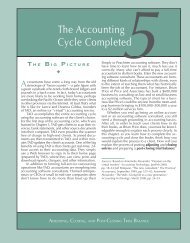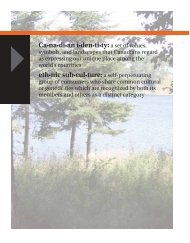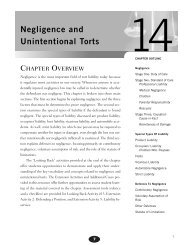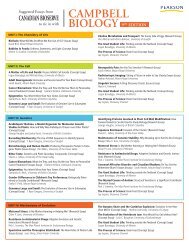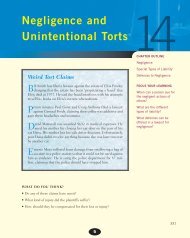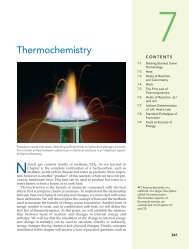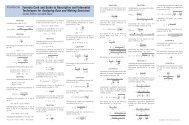PART Introduction to Cultural Anthropology - Pearson Canada
PART Introduction to Cultural Anthropology - Pearson Canada
PART Introduction to Cultural Anthropology - Pearson Canada
You also want an ePaper? Increase the reach of your titles
YUMPU automatically turns print PDFs into web optimized ePapers that Google loves.
Late Nineteenth Century<br />
Sir Edward Tylor<br />
Sir James Frazer<br />
Lewis Henry Morgan<br />
Early Twentieth Century<br />
Bronislaw Malinowski<br />
Franz Boas<br />
Margaret Mead<br />
Ruth Benedict<br />
Zora Neale Hurs<strong>to</strong>n<br />
Armchair anthropology, first definition of culture<br />
Armchair anthropology, comparative study of religion<br />
Insider’s view, cultural evolution, comparative method<br />
Functionalism, holism, participant observation<br />
<strong>Cultural</strong> relativism, his<strong>to</strong>rical particularism, advocacy<br />
Personality and culture, cultural constructionism, public<br />
anthropology<br />
Personality and culture, national character studies<br />
Black culture, women’s roles, ethnographic novels<br />
FIGURE 1.2 Key Figures in<br />
<strong>Cultural</strong> <strong>Anthropology</strong><br />
Mid- and Late Twentieth Century and Early Twenty-First Century<br />
Claude Lévi-Strauss Symbolic analysis, French structuralism<br />
Beatrice Medicine<br />
Native American anthropology<br />
Eleanor Leacock<br />
<strong>Anthropology</strong> of colonialism and indigenous peoples<br />
Marvin Harris<br />
<strong>Cultural</strong> materialism, comparison, theory building<br />
Mary Douglas<br />
Symbolic anthropology<br />
Michelle Rosaldo<br />
Feminist anthropology<br />
Clifford Geertz<br />
Interpretive anthropology, thick description of local culture<br />
Laura Nader<br />
Legal anthropology, “studying up”<br />
George Marcus<br />
Critique of culture, critique of cultural anthropology<br />
Gilbert Herdt<br />
Gay anthropology<br />
Nancy Scheper-Hughes Critical medical anthropology<br />
Leith Mullings<br />
Anti-racist anthropology<br />
Sally Engle Merry<br />
Globalization and human rights<br />
accuracy of the biblical narrative of human origins. The<br />
Bible, for example, does not mention the existence of<br />
people in the New World.<br />
In the latter half of the nineteenth century, the discovery<br />
of the principles of biological evolution by Charles<br />
Darwin and others had a major impact on anthropology<br />
by offering a scientific explanation for human origins<br />
and contemporary human variation. Biological evolution<br />
says that early forms evolve in<strong>to</strong> later forms through<br />
the process of natural selection, whereby the most<br />
biologically fit organisms survive <strong>to</strong> reproduce while<br />
those that are less fit die out. Darwin’s model is, thus, one<br />
of continuous progress of increasing fitness through<br />
struggle among competing organisms.<br />
The most important founding figures of cultural<br />
anthropology of the late nineteenth and early twentieth<br />
centuries include Sir Edward Tylor and Sir James Frazer<br />
in England and Lewis Henry Morgan in the United States<br />
(see Figure 1.2). Inspired by the concept of biological<br />
evolution, they developed a model of cultural evolution<br />
whereby all cultures evolve from lower <strong>to</strong> higher forms<br />
over time. This view placed non-Western peoples at<br />
a “primitive” stage and Euro-American culture as<br />
“civilization” and assumed that non-Western cultures<br />
would either catch up <strong>to</strong> the level of Western civilization<br />
or die out.<br />
Polish-born Bronislaw Malinowski is a major figure of<br />
early cultural anthropology. In the first half of the<br />
twentieth century, he established a theoretical approach<br />
called functionalism: the view that a culture is similar <strong>to</strong><br />
a biological organism, in which parts work <strong>to</strong> support the<br />
operation and maintenance of the whole. Religion and<br />
family organization, for example, contribute <strong>to</strong> the functioning<br />
of the whole culture. Functionalism is linked <strong>to</strong> the<br />
concept of holism, the view that one must study all aspects<br />
of a culture in order <strong>to</strong> understand the whole culture.<br />
Franz Boas is considered the founder of North American<br />
cultural anthropology. Born in Germany and<br />
educated in physics and geography, he came <strong>to</strong> the United<br />
States in 1887 (Patterson 2001:46ff). He brought with<br />
him a skepticism <strong>to</strong>ward Western science gained from a<br />
year’s study with the Inuit, the indigenous people of<br />
Baffin Island (see Map 1.2). The Inuit experience taught<br />
him that people in different cultures have different<br />
perceptions of even basic physical substances, such as<br />
water. Boas recognized the individuality and validity of<br />
different cultures. He introduced the now widely known<br />
concept of cultural relativism, or the view that each<br />
culture must be unders<strong>to</strong>od in terms of the values and<br />
ideas of that culture and not be judged by the standards<br />
of another. According <strong>to</strong> Boas, no culture is more<br />
advanced than another. His position, thus, contrasted<br />
CHAPTER 1 ■ <strong>Anthropology</strong> and the Study of Culture 11



